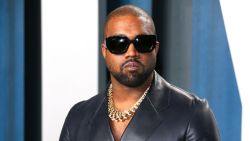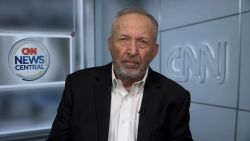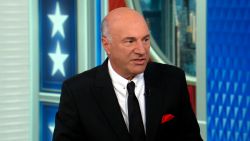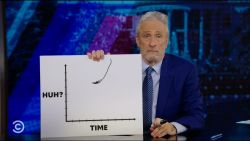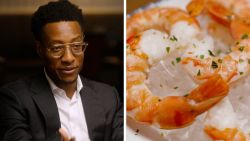Kanye West said he’s terminating his rocky two-year-old partnership with the Gap because of “substantial noncompliance.”
His lawyer Nicholas Gravante said in a statement Thursday that West was left with “no choice but to terminate their collaboration” because he alleges the retailer breached their partnership by not opening branded Yeezy stores and distributing his apparel as originally planned, among other issues.
West later appeared on CNBC’s “Closing Bell” on Thursday, describing his frustrations with the retailer.
“It was always a dream of mine to be at the Gap and bring the best product possible to the masses,” he told the network, adding that he envisioned top-quality items that could be sold for $20. But, he says, he wasn’t ultimately able to set the price he wanted for the resulting collection.
“Sometimes I would talk to the guys, the leaders, and it would be like I was on mute or something.”
Gap: ‘Vision is not aligned’
Gap Inc. (GPS) confirmed it is pulling the plug on the Yeezy partnership via an internal company email late Thursday that was seen by CNN Business.
“We wanted to address the headlines of today and the past several weeks related to Yeezy Gap. Simply put…while we share a vision of bringing high-quality, trend-forward, utilitarian design to all people through unique omni experiences with Yeezy Gap, how we work together to deliver this vision is not aligned. And we are deciding to wind down the partnership,” Mark Breitbard, president and CEO of Gap Brand, said in the email.
Breitbard said in the note that the retailer had “throughout this partnership upheld our commitments – and the teams have done so with the utmost integrity, navigating obstacles and demonstrating incredible resolve.”
“Yeezy Gap was launched to be a disruptive, highly creative endeavor – one that’s challenged us to think and operate differently, attracted new, younger and more diverse customers….. we will take the new, hyper-entrepreneurial ways of working we learned through this process with us as we move forward,” Breitbard said in the note.
As it now moves to wind down the partnership, Gap said existing merchandise from Yeezy Gap will continue to be sold in the company’s stores and its website. It also expects to continue to sell forthcoming collections from Yeezy Gap – including a holiday 2022 collection priced at around $100 or below – in the fall and into the first half of 2023.
“Gap’s substantial noncompliance with its contractual obligations has been costly,” wrote Gravante, who co-chairs the litigation group at Cadwalader, Wickersham and Taft. “Ye will now promptly move forward to make up for lost time by opening Yeezy retail stores.”
Gap shares fell more than 3.5% Thursday.
The partnership was announced in June 2020, immediately giving the beleaguered retailer a much-needed boost of relevance. For example, a $200 jacket designed by West was an immediate hit, but was only available online.
West also said that Gap was required to sell 40% of Yeezy Gap products in its retail stores, which hasn’t materialized, according to The Wall Street Journal.
The relationship soured in recent months. West, also known as Ye, criticized Gap for not listening to him. “You have to really give me the position to be Ye and let me do what I’m thinking, or I have to do the thinking somewhere else,” he said in a now-deleted post on Instagram, the Journal reported.
Neil Saunders, managing director of GlobalData, wrote in a note that the breakup was “not entirely unexpected” and wouldn’t financially harm Gap’s bottom line.
“Gap is a cautious company with a stale brand that usually eschews bold moves. In contrast, Kanye is a radical innovator who loves to shake things up,” Saunders wrote. “While Kanye could have injected a dose of energy into Gap, the incompatibility of the two visions meant that frustrations were inevitable. In some ways, Kanye was just too extreme for Gap.”
West recently told Bloomberg that it was “time for me to go it alone,” adding that he no longer wants to have companies “standing in between me and the audience.”
–CNN’s Parija Kavilanz contributed to this report


